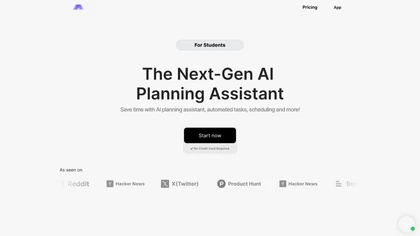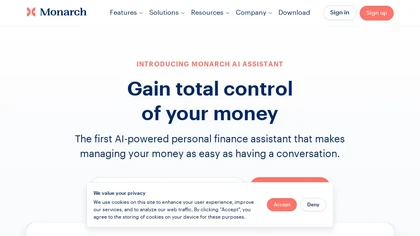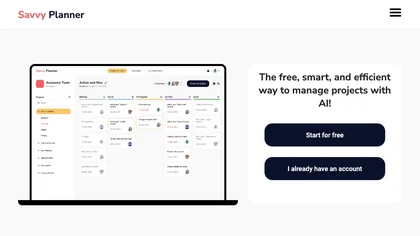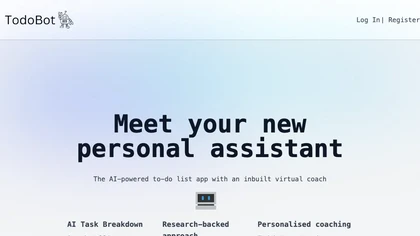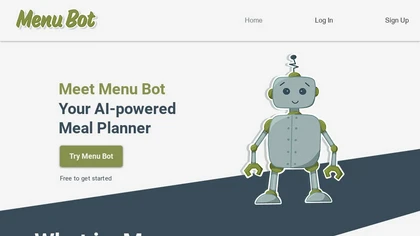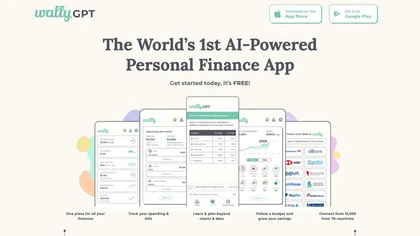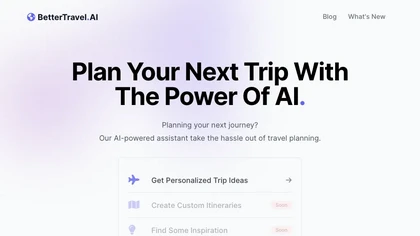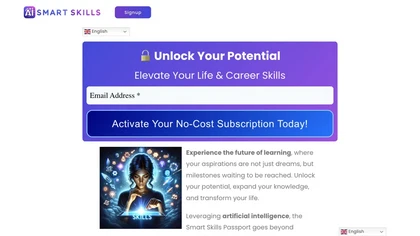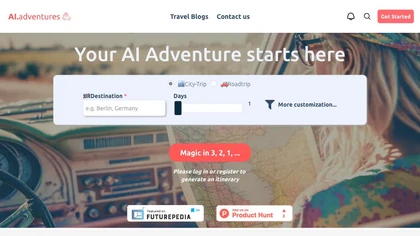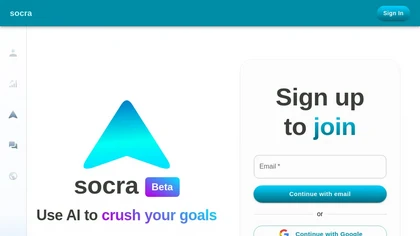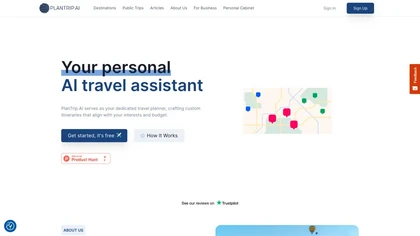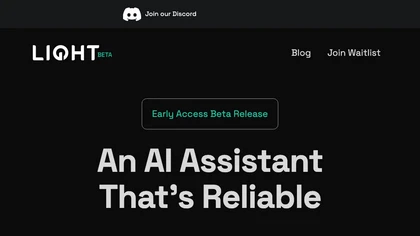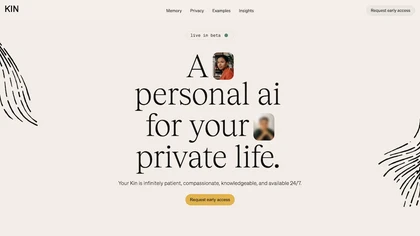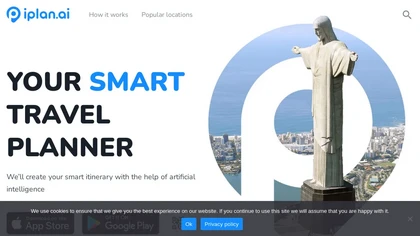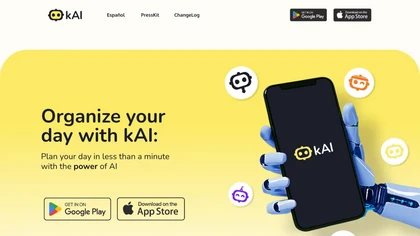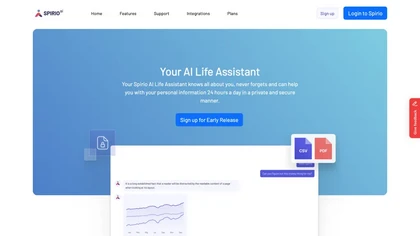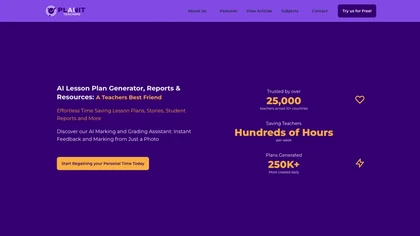AI use cases for Problem-solving
Generative AI can be applied in various applications for problem-solving. Here are some examples to explore below for inspiration with AI tools to get you started with using AI in problem-solving.
🛠️ 70 AI tools for Problem-solving
Explore a dynamic list of some of the most popular tools to get you started with various AI use cases and applications for Problem-solving to streamline your workflows and productivity today.
Tendi features
- AI-powered personal financial advisor
- Assists in setting financial goals, planning, budgeting, and achieving milestones
- Analyzes spending, saving, and investing behaviors
- Provides actionable insights and personalized financial advice
- Ensures data security through advanced encryption and strict privacy protocols
MindGenie features
- Automates tasks
- Intuitive interface
- Intelligent task scheduling
- AI-generated tasks
- Seamless integration with calendars and task management tools
Monarch money features
- Net worth syncing
- Budgeting
- Recurring investments
- Spending insights
- Collaborative solutions
Hubit Plan features
- AI-powered task management
- Telegram bot integration
- Workflow optimization
- Task planning for next two days
- AI technology for problem-solving
MealPlanner features
- Personalized meal planning
- Tailored meal plans based on dietary restrictions
- Customized meal plans based on personal taste and preference
- In-app shopping list feature
- Step-by-step cooking instructions
Plan My Day AI features
- Day planner
🔥
Create your account, save tools & get personal recommendations
Receive a weekly digest of our handpicked top tools.
Unsubscribe anytime
Savvy Planner features
- Task Automation
- Data Analysis
- Language Processing
- Project Scheduling
- Deadline Prediction
Mealpractice features
- Recipe generation
- Ingredient selection
- Nutrition style customization
- Protein selection
- Cuisine style selection
Todobot
4.8Todobot features
- Virtual coach
- Ai task breakdown
- Personalized coaching system
StudyPlannr features
- Generate personalized study plans
- Consider subjects, topics, and assessment dates
- Self-regulate and improve revision efficiency
- Download as pdf or print for easy reference
- Support students in goal setting and cultivating good study habits
Parthean AI features
- Automate financial tasks
- Streamline money management
- Automatic saving, investing, and debt repayment
- Facilitate money transfers between accounts
- Provide insights on spending, investing, and credit
Cleo features
- Budgeting assistance
- Cash flow tracking
- AI-powered features
- Secure platform with encryption
- Financial decision insights
Gather Closed Beta features
- Store information for later
- Schedule events
- Set reminders
- Organize thoughts by voice input
- Help with making reservations
MealMate
5MealMate features
- Plan meals
- Tailor dietary preferences
- Consider budget
- Adjust for time constraints
Mint features
- Financial transaction tracking
- Account linking with over 17,000 financial institutions
- Categorization of transactions
- Insights on monthly spending habits
- Expense tracking and analysis
Mymealplan features
- Generates personalized meal plans
- Curates a list of the best recipes from the web
- Easy-to-use app
- Caters to various dietary preferences
- Provides grocery list for easy shopping
Menubot features
F.I.R.E on track features
- AI-powered financial assistant
- Personalized recommendations based on goals
- Real-time financial assistance
- Income, expenses, and savings tracking
- Goal reminders and progress tracking
FoodZilla.io features
- Recipe builder
- Meal planning system
- Nutrition reports
- Mobile app
- Secure messaging
PlanTripAI features
- Trip planning
- Customized itinerary
- Personalized travel
- Generate based on interests
- Budget
Selftalk.ing
4.9Selftalk.ing features
- Unlimited conversations with future self
- Quick chat interface
- Email reminders
- Personalized advice and motivation
- Access to past conversations
Wally.me features
- Expense tracking
- Bill monitoring
- Budget management
- Financial insights and guidance
- Personalized Q&A with WallyGPT
AI Meal Planner features
- Generates personalized meal and workout plans
- Includes fitness chatbot support
- Provides recipes
- Tailored to user's goals and needs
- Pricing options available
Mind Your Now features
- AI-powered planner
- Intelligent task scheduling
- Effortless task management
- Reminders and notifications
- Streamline scheduling process
Rejoy features
- family organizer
- calendar synchronization
- task management
- personalized advice
- meal planning
Lebenmaster features
- 3-step process for goal forecasting
- Daily progress logs
- Task management functionality
- Brainstats feature
- Support for executing tasks faster and efficiently
Motiv8 features
- Goal breakdown into detailed task lists
- Browse trending ideas and ready-to-use task lists
- Seamless task management
- Personalized guidance and recommendations
- Data security and privacy measures
Tripplanner.ai features
- Suggest potential destinations
- Receive personalized itineraries
- Suggest nearby restaurants and attractions
- Plan a trip without having to research destinations and activities for hours
Travelplan features
- Destination selection
- Itinerary generation
- Travel preferences customization
- Language preference selection
- Friends sharing
Planit Earth features
- Generate personalized itineraries
- Cater to traveler's interests and budget
- Provide detailed itineraries
- Easily accessible through a link or pdf
Sixty features
- Prioritization of to-do list
- Inbox management
- Appointment scheduling
- Agenda creation
- Reminder system
Bettertravel features
- Generate personalized travel recommendations
- Customize itineraries based on user preferences and interests
- Assist with travel planning without extensive research
- Easily input budget and travel plans
- Provide tailored recommendations for a more enjoyable trip
Roam Around features
- Travel planning
- Customized travel plans
- Pet-friendly itineraries
- Budget-friendly trips
- Honeymoon itineraries
- Family-friendly itineraries
FlowSavvy features
- Automatic time blocking
- Smart scheduling features
- Task adjustment based on plan changes
- Color-coded tasks visualization
- Custom scheduling
SmartLifeSkills
4.8SmartLifeSkills features
- Interactive platform with AI chatbots
- Multilingual lessons with authentic accents
- Adjustable playback speed
- Advanced text-to-speech technology
- Custom quiz generator
Lifesage features
- Health
- Wealth
- Wisdom
- Personal development
- Self-improvement
AMBLR - AI Travel Planner features
- Travel planning
- Curated approach
- Personalized guidance
- Activities recommendation
- Trip editing
Wonderplan features
- Personalized itinerary generation
- Customizable itinerary planning
- Real-time collaboration
- Trip feedback improvement
- Connecting with like-minded travelers
AI adventures
1.8AI adventures features
- Generate personalized travel plans
- Offer options for city trips, road trips, and custom itineraries
- Use openai's gpt4 model
- Interactive travel blogs
Socra features
- Goal setting
- Assistance
- Achievement
MyFit AI features
- Program generation
- Meal plan generation
- Saving programs
- Input personal data
PlanTrip features
- Custom itinerary planning
- Tailored recommendations
- Destination insights
- AI-generated itineraries
- Seamless journey planning
SkedPal
5SkedPal features
- AI-powered smart calendar app
- Efficient task scheduling
- Task prioritization automation
- Automatic agenda adjustments
- Realistic and time-bound schedules
Mealmind features
- Generate personalized meal plans
- Interactive shopping lists
- Tailored to individual dietary requirements
- Food preferences
- Fitness goals
- Simplify grocery shopping
- Provide step-by-step instructions for cooking
- Variety of diets
Whenable features
- Todo list management
- Goal tracking
- Personalized roadmap creation
- AI assistance in task and goal identification
- Scoring system for task and goal prioritization
My Travel Brain
1.6My Travel Brain features
- Plan travel
- Knowledge of travel destinations
- Answer questions about travel destinations
Plan My Trip ASAP features
- Custom itinerary planning
- Pre-made itinerary selection
- Top dining recommendations
- Top bar recommendations
- Top cafe recommendations
Travelities features
- Trip planning
- Personalized recommendations
- Travel deals
- Place recommendations
- Things to do
Light features
- Ai task assignment
- Productivity improvement
- Video editing
- Photo editing
- Email reading
- Context understanding
- Calendar management
YouGotCooking features
- Recipe suggestion based on available ingredients
- AI-powered personalized recipe recommendations
- Consideration of physical taste in recipe suggestions
- Multilingual support for recipe suggestions
- Utilizes GPT-3 model for enhanced results
rotime features
- Google and email sign-in
- Customizable events with flexible start and end times
- Focus-aware user interface
- Support for reusable templates for events and tasks
- Access to historical data and export personal data
Seazn features
- Generate personalized recipes
- Learns cooking habits
- Updates knowledge
- Filter recipes by meal type and cooking time
- Reduce food waste
Well Me Right features
- AI matching and Health Coach capabilities
- Personalized coaching
- Dietary tracking, nutritional guidance
- Guided meditation sessions
- Adaptive health partner
Kin AI
5Kin AI features
- Personalized Support
- Long Term Memory Capabilities
- Privacy Respecting
- Proactive Engagement
Augment AI features
- Keep track of scattered digital life
- Learns and accesses data from various apps
- Automatically saves and summarizes important information
- Creates personalized content
- Anticipates and completes sentences
FreePlanTour features
- Travel itinerary generation
- Personalized travel guides
- Multi-language support
- User-friendly interface
- Subscription plans
iPlan.ai features
- Create personalized itineraries
- Save time
- Access itineraries anywhere
- Make changes as needed
- Receive updates via email
Nomadspot features
- Trip organization
- Create travel itinerary
- Personal map sharing
- Community sharing
- Ai-powered planner
kAI KGApps features
- Task organization
- Schedule prioritization
- Time management
- Task tracking
- Efficient planning
Spirio AI features
- Personal productivity assistant
- Organizing crucial tasks and reminders
- Document gathering and organization
- Data security prioritization
- 24/7 availability
GoalFocus features
- Create SMART Goals
- Break goals into subgoals, tasks, and subtasks
- Prioritize tasks with Eisenhower Matrix
- Increase focus on each task
- Overcome procrastination with timeboxing
Summer AI features
- Ai gps technology
- Personalized experience
- Walking and driving navigation
- Augmented reality discoveries
- Visually enhanced journey
Organiser features
- Advanced algorithms
- Smart technology
- Streamlines kitchen tasks
- Efficient meal preparation
- Enhanced culinary skills
Planit Teachers features
- Lesson plans generation
- Student report generation
- AI marking assistance
- Resource library across subjects and age groups
- Automated grading process
Local Buddy features
- AI-powered travel planner
- Provides personalized recommendations
- Offers unique places to eat, landmarks to explore, and immersive activities
- Integrates with Google Maps for step-by-step directions
- Available on Android and iOS
Plan Quest features
- Visual timeline
- Objectives and key results (OKRs)
- Notion-like editor
- Reflection canvas
- Timeline visualization
Dinnerfy features
- Dinner AI for meal suggestions
- Recipe GPT for recipe collection
- Grocery GPT for sorting and sharing grocery list
- Delivery Integration with Instacart
- Diet Controls for setting restrictions and goals
Moments features
- Task Prioritization
- Events and Reminders
- AI Messages Composer


